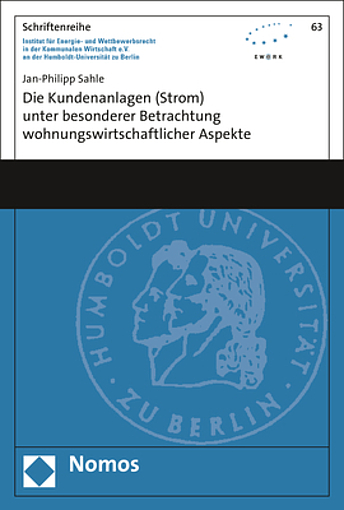englischIn the context of energy transition, decentralised power supply has become increasingly important. In the meantime, housing companies are increasingly supplying their tenants with electricity. Tenants can be supplied with electricity by housing companies using so-called tenant electricity models. Electricity costs as part of the maintenance costs can be a significant burden. Therefore, both tenants and housing companies are interested in keeping the maintenance costs as low as possible. The book is aimed primarily at housing companies that are active in both privately funded and publicly funded housing construction.
In order to be able to offer tenants a favourable electricity price, housing companies depend on tenant electricity models to operate their electricity infrastructure as customer systems in accordance with § 3 no. 24a of the Energy Management Act. The customer system pursuant to § 3 no. 24a of the Energy Management Act was legally defined in 2011. This definition is characterised by a variety of indefinite legal terms, which makes it highly controversial in literature and case law. The author deals in-depth with the definition of the customer system. In doing so, he works in a practical way and uses various examples from recent case law to illustrate when an unregulated customer system pursuant to § 3 no. 24a of the Energy Management Act ends, and a regulated energy supply network pursuant to § 3 no. 16 of the Energy Management Act begins.
In a subsequent step, it is then valid for the housing companies to implement the power supply of their tenants. In each case, the author examines the contractual possibilities of integrating the operation of customer systems, as well as the actual power supply into the tenancy. On the one hand, he examines to what extent the costs of a customer system can be allocated under tenancy law, so that the gratuitousness of a customer system is maintained. On the other hand, he examines under which legally permissible conditions housing companies can act directly as electricity suppliers to their tenants, especially when installing a cogeneration plant in their property, and at the same time observing the energy law freedom of discrimination. Finally, in the context of power supply, the legal issues of whether housing companies in the supply of their tenants with electricity are subject to the duty of disclosure pur-suant to § 5 of the Energy Management Act, and to what extent the metering point management within customer facilities must be made pursuant to § 20 para. 1d of the Energy Management Act, are discussed.
Im Rahmen der Energiewende hat die dezentrale Stromversorgung immer mehr an Bedeutung gewonnen. Inzwischen versorgen auch Wohnungsunternehmen vermehrt ihre Mieter mit Strom. Mieter können anhand von sogenannten Mieterstrommodellen durch Wohnungsunternehmen mit Strom versorgt werden. Stromkosten als Teil der Unterhaltskosten können eine erhebliche Belastung darstellen. Daher sind sowohl Mieter als auch die Wohnungsunternehmen daran interessiert, die Unterhaltskosten möglichst gering zu halten. Das Buch richtet sich vorwiegend an Wohnungsunternehmen, die sowohl im freifinanzierten als auch öffentlich geförderten Wohnungsbau tätig sind.
Um den Mietern einen günstigen Strompreis anbieten zu können, sind Wohnungsunternehmen im Rahmen von Mieterstrommodellen darauf angewiesen, ihre Strominfrastruktur als Kundenanlagen gemäß § 3 Nr. 24a EnWG zu betreiben. Die Kundenanlage gemäß § 3 Nr. 24a EnWG wurde im Jahr 2011 legaldefiniert. Diese Definition ist durch eine Vielzahl von unbestimmten Rechtsbegriffen geprägt, wodurch sie in der Literatur sowie Rechtsprechung hoch umstritten ist. Der Verfasser setzt sich vertieft mit der Kundenanlagendefinition auseinander. Hierbei arbeitet er praxisnah und veranschaulicht anhand diverserer Beispiele aus der jüngeren Rechtsprechung, wann eine unregulierte Kundenanlage gemäß § 3 Nr. 24a EnWG endet und ein reguliertes Energieversorgungsnetz gemäß § 3 Nr. 16 EnWG anfängt.
In einem nächsten Schritt gilt es sodann für die Wohnungsunternehmen, die Stromversorgung ihrer Mieter zulässig umzusetzen. Der Verfasser beleuchtet jeweils die vertraglichen Möglichkeiten, sowohl den Betrieb von Kundenanlagen als auch die eigentliche Stromversorgung in das Mietverhältnis zu integrieren. Hierbei wird zum einen begutachtet, inwiefern die Kosten einer Kundenanlage mietrechtlich umgelegt werden können, so dass weiterhin die Unentgeltlichkeit einer Kundeanlage gewahrt ist. Zum anderen wird geprüft, unter welchen mietrechtlich zulässigen Voraussetzungen Wohnungsunternehmen insbesondere bei Installation eines BHKW in ihren Liegenschaften unmittelbar als Stromlieferant gegenüber ihren Mietern auftreten können und zugleich die energierechtliche Diskriminierungsfreiheit eingehalten wird. Abschließend werden im Rahmen der Stromversorgung noch die Rechtsfragen erörtert, ob Wohnungsunternehmen bei der Versorgung ihrer Mieter mit Strom der Anzeigepflicht gem. § 5 EnWG unterliegen und inwiefern die Zählerpunktverwaltung innerhalb von Kundenanlagen gemäß § 20 Abs. 1d EnWG zu erfolgen hat.


